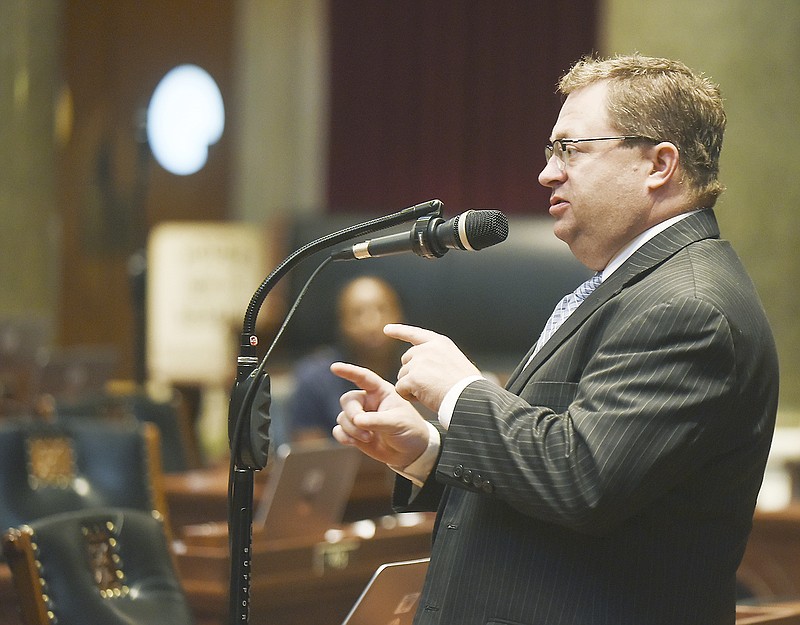Lt. Gov. Mike Kehoe told two dozen state employees Tuesday evening their work in the state's new leadership academy class "is pretty exciting."
Until now, he said, Missouri government officials "really haven't provided the opportunity for potential leaders" to learn skills and advance in their jobs and agencies.
Kehoe was the third statewide official the class members heard from Tuesday, the first of two days in this month's segment of their six-month program, where the class members learn about state operations and programs.
The lieutenant governor noted he'd been involved in several leadership programs before winning a state Senate seat eight years ago - including one at his Ford dealership.
"I'm looking for people who can make decisions and do the right thing," he said, and leadership training can help develop those skills.
He said the program - planned when Eric Greitens was still governor, and continued after Greitens resigned and Mike Parson was elevated from lieutenant governor to governor - is part of an effort to change state government's culture and flexibility, so it can respond better t0 problems and issues, and provide taxpayers with better service.
In a morning session, State Treasurer Eric Schmitt reported his office manages state government's $4 billion portfolio - including money from taxes and other sources.
"As money comes in, we invest it," he explained, then "make sure the bills get paid on time" - including the salaries and benefits earned by employees.
Schmitt noted the treasurer's office has some jobs defined by the Constitution, and others described by state laws - such as the 529 College Savings program, Unclaimed Property and a new program to help Missourians with disabilities.
He said other things - like the new online "ShowMe Checkbook" that shows the state's financial data - are innovations to help Missourians know more about their government.
"We have 2 million data points," he said, adding the new site helps "to make that (financial) information more transparent."
As for leadership skills, he said: "I think the people who do this best (have) a sense of humility.
"You don't have all the answers (and) don't take yourself too seriously."
Good leaders work to "build a coalition to solve problems."
Although not a constitutional office holder, state Budget Director Dan Haug and his staff play a significant role in the development of the state's budget each year.
Haug told the leadership class that state departments and agencies are now finishing their budget requests for the state business year that starts next July 1, because those are due to his office by Oct. 1.
"Then we figure out how much we have to spend," he said, based on revenue estimates developed now to predict the state's income 18 months from now. "A lot of things can change" from initial estimate to final income counted on June 30, the end of the business year.
Although there are many sources of revenue, including the federal government, Haug said most of Missouri government's income comes from income taxes and sales taxes.
Schmitt told the class that Missouri's current "employment rate is better than national average, (because) our economy is pretty diverse."
Haug said unemployment in the state now is "at historically low levels, and that's a really good sign.
"Before the recession, we were a little over 4 percent" unemployment, he reported, and now the state is under 4 percent, and workers' wages are finally starting to go up.
However, so is inflation, which is another factor in making economic forecasts.
Even in the 2008 recession, Haug said, when Missouri's revenues dropped, its fixed expenses stayed the same or rose.
Missouri currently has a roughly $28 billion budget, but only about a third of that is general revenue that lawmakers and state administrators can make changes to, he said.
And "half of it is things we're required to do by law," such as pay Medicaid costs, and another third is directed toward education - leaving little room for flexibility, even when the discussion is about $9 billion, Haug said.
If the state has to make cuts, the areas to cut generally are limited to education and social services - a fact that can get lost when lawmakers or special interest groups push to save some programs at the expense of others.
However, Missouri has maintained its AAA bond-rating - the best rating available from three different bond-rating services - for 50 years.
In conferences with the bond rating agencies, Haug said, Missouri has that rating because "we make the hard decisions when we have to."
Those decisions are also required by the state Constitution, which requires the budget to be balanced at the end of the business year.
Attorney General Josh Hawley said his office averages about 400 employees, with half of them being attorneys who work on a variety of state issues.
"Our largest area of jurisdiction is the Missouri Merchandising Practices Act," he said, a consumer protection law that gives the attorney general's office the power to "enforce, investigate and prosecute" potential violators.
Hawley called the law "one of the most robust" in the nation - and is the law being used to challenge opioid manufacturers who have helped create the "biggest public health crisis in this country."
His office also defends most state agencies when they are sued, and defends state laws when they're challenged in court.
Hawley's office has challenged social media giants like Facebook and Google over the personal information they share about Missourians.
Hawley currently is running for the U.S. Senate in a challenge to incumbent Claire McCaskill.
However, he didn't mention that race during his presentation to the leadership academy and said his office tries "to stay out of the political process."
The leadership class also heard from a panel of reporters who cover the Capitol and state government, and who talked about working with state officials to get accurate information to be used in news stories.

